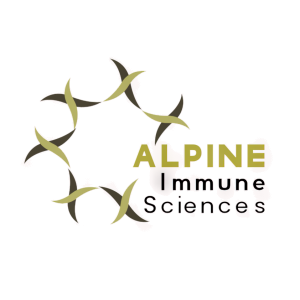Alpine Immune Sciences Presents Update Of ALPN-303 Phase 1 (RUBY-1) Clinical Data at the American Society of Nephrology Kidney Week 2022 Meeting
Alpine Immune Sciences presented new data on ALPN-303 at the American Society of Nephrology Kidney Week 2022, showcasing its potential in treating IgA nephropathy (IgAN). The phase 1 study (RUBY-1) demonstrated that ALPN-303 is well tolerated in doses up to 960 mg and shows dose-dependent effects, reducing serum galactose-deficient IgA1 (Gd-IgA1) by up to 60%. These findings support plans for future clinical trials focusing on glomerulonephritis. The company emphasizes ALPN-303's best-in-class profile and its promising role in various autoimmune conditions.
- ALPN-303 reduced serum Gd-IgA1 by up to 60% after a single dose.
- The drug has shown good tolerance in doses up to 960 mg in healthy volunteers.
- Future clinical trials are planned based on promising results from RUBY-1 study.
- None.
- ALPN-303 dose-dependently reduces serum galactose-deficient IgA1 (Gd-IgA1), a pivotal molecule implicated in the pathogenesis of IgA nephropathy (IgAN) -
- Data further supports best-in-class profile and initiation of glomerulonephritis (GN) basket clinical trial -
HIGHLIGHTS OF TODAY'S PRESENTATION:
- ALPN-303 has been well tolerated as single intravenous or subcutaneous (SC) doses of up to 960 mg in adult HV's and exhibits dose-related pharmacokinetic and on-target pharmacodynamic effects.
-
ALPN-303 maintains target coverage of free APRIL for 2-3 and ≥4 weeks with 80 and 240 mg, respectively, corresponding to reductions in serum Ig and antibody-secreting cells (CD38hi plasmablasts/plasma cells). In addition, ALPN-303 also dose-dependently reduces serum Gd-IgA1 by up to
60% , 4 weeks after a single dose. - These data support dose regimens of 80-240 mg SC every 4 weeks in future glomerulonephritis studies.
“The new data importantly indicate that ALPN-303 also reduces Gd-IgA1, an important effector molecule and/or biomarker in IgAN, similar to the previously disclosed effects on serum immunoglobulins and antibody-secreting cells,” said
Poster Title: Phase 1 Study in Healthy Adults of the Safety, Tolerability, Pharmacokinetics, and Pharmacodynamics of ALPN-303, a Dual BAFF/APRIL Antagonist for the Treatment of Autoimmune Glomerulonephritides (GN)
Poster Number: TH-PO499
About ALPN-303 and the RUBY-1 Study
ALPN-303 is a dual antagonist of the BAFF (B cell activating factor) and APRIL (a proliferation inducing ligand) cytokines, which play key roles in the activation and survival of B cells. Based upon an engineered TACI (transmembrane activator and CAML interactor) domain, ALPN-303 exhibits greater potency in preclinical studies versus wild-type TACI-based comparators, as well as other inhibitors of BAFF and/or APRIL alone. ALPN-303 is in development for multiple B cell and/or autoantibody-related diseases, such as systemic lupus erythematosus, glomerulonephritides, and autoimmune cytopenias.
RUBY-1 (NCT05034484) is a phase 1, randomized, placebo-controlled study in healthy adult volunteers designed to evaluate the safety, tolerability, pharmacokinetics, and pharmacodynamics of single doses of intravenously and subcutaneously administered ALPN-303. Initial data show ALPN-303 to be well tolerated up to 960 mg with dose-dependent pharmacokinetics and reductions in circulating immunoglobulins, galactose-deficient IgA1 and antibody-secreting cells, supporting the use of a once every four-week dose regimen for subsequent studies.
About
Forward-Looking Statements
This release contains forward-looking statements within the meaning of Section 27A of the Securities Act of 1933, Section 21E of the Securities Exchange Act of 1934 and the Private Securities Litigation Reform Act of 1995. These forward-looking statements are not based on historical fact and include statements regarding our platform technology and potential therapies; the potential efficacy, safety profile, future development plans, addressable market, regulatory success, and commercial potential of our product candidates; and the timing of our public presentations and potential publication of future clinical data. Forward-looking statements generally include statements that are predictive in nature and depend upon or refer to future events or conditions and include words such as “may,” “will,” “should,” “would,” “expect,” “plan,” “intend,” and other similar expressions, among others. These forward-looking statements are based on current assumptions that involve risks, uncertainties, and other factors that may cause actual results, events, or developments to be materially different from those expressed or implied by such forward-looking statements. These risks and uncertainties, many of which are beyond our control, include, but are not limited to: clinical trials may not demonstrate safety and efficacy of any of our product candidates; our ongoing discovery and preclinical efforts may not yield additional product candidates; our discovery-stage and preclinical programs may not advance into the clinic or result in approved products; any of our product candidates may fail in development, may not receive required regulatory approvals, or may be delayed to a point where they are not commercially viable; we may not achieve additional milestones in our proprietary or partnered programs; the impact of competition; adverse conditions in the general domestic and global economic markets; the impact of the COVID-19 pandemic on our business, research and clinical development plans and timelines and results of operations, including the impact on our clinical trial sites, collaborators, and contractors who act for or on our behalf, may be more severe and prolonged than currently anticipated; as well as the other risks identified in our filings with the
View source version on businesswire.com: https://www.businesswire.com/news/home/20221103006175/en/
ir@alpineimmunesciences.com
Red House
kelli@redhousecomms.com
Source:
FAQ
What are the clinical implications of ALPN-303 for IgA nephropathy?
When will the next clinical trials for ALPN-303 start?
What is the RUBY-1 study for ALPN-303?






